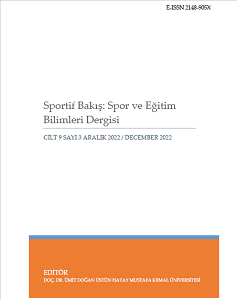Sporcuların Akılcı ve Sezgisel Karar Verme Stilleri ile Zihinsel Hazır Oluş Düzeyleri Arasındaki İlişkinin İncelenmesi
Investigation of the Relationship Between Rational and Intuitive Decision-Making Styles of Athletes and Their Levels of Mental Readiness
Author(s): Bahar Güler, Barış Mergan, Mehmet Kargün, Ömer Faruk YazıcıSubject(s): Psychology, Health and medicine and law, Sports Studies
Published by: Bingöl Üniversitesi, Spor Bilimleri Fakültesi
Keywords: Rational decision making; intuitive decision making; mental readiness;
Summary/Abstract: This research aims to examine the relationship between the rational and intuitive decision-making styles of athletes and their mental readiness levels. The research was designed by adopting the relational survey model, which is among the quantitative research methods. The research group, in which the easily accessible sampling method was adopted, consisted of 66.1% (242) male and 33.9% (124) female athletes, 76% (278) of the students studying at the faculty of sports sciences and actively doing sports at the same time. 24% (88) of them do not read regularly while they are studying, and 50.3% (184) of students are sportsmen who are interested in individual sports and 49.7% (182) are interested in team sports. Within the scope of the research, IBM SPSS 25.0 package program was used to analyze the data obtained from the participants. Considering the statistical findings that emerged after the analysis of the data, it was found that rational and intuitive decision-making styles did not differ significantly according to gender and reading status, while there was no significant difference in the interest dimension of mental readiness according to the type of sport, while there was a significant difference in all other dimensions. While 22% of the variance of rational decision-making styles, which is the dependent variable, was explained by the independent variables, 17% of the variance of the heuristic decision-making styles, which is also the dependent variable, is among the important findings. As a result; It was seen that interest, focus, fear, mental preparation, motivation dimensions of mental readiness were a significant (important) predictor on rational decision-making styles, while the effect of keeping cool-headedness on rational decision-making styles was not significant. On the other hand, besides the conclusion that mental readiness is a significant (important) predictor of interest, focus, motivation and mental preparation on intuitive decision making, it has been seen that the effect of fear and keeping cool-headedness dimension on intuitive decision making is not significant.
Journal: Sportif Bakış: Spor ve Eğitim Bilimleri Dergisi
- Issue Year: 9/2022
- Issue No: 3
- Page Range: 381-396
- Page Count: 16
- Language: Turkish

